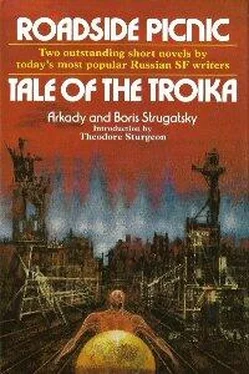The commandant tried to explain that it was impossible to drive up the hill, but his explanations were greeted with icy wonderment on the part of Lavr Fedotovich, infected with the thought of steaming milk, and with Farfurkis’ moans of “Sour cream! From the cellar!” He did not try to argue. To tell the truth, I did not understand either, but I was curious.
I started the engine, and the car sped merrily toward the hill. The odometer clicked off the miles, the wheels whirred in the grass, Lavr Fedotovich stared straight ahead, and the back seat, in anticipation of sour cream and milk, started an argument about what mosquitoes feed on in swamps. Khlebovvodov based his argument on experience and maintained that they feed exclusively on responsible workers on expeditions. Farfurkis, giving way to wishful thinking, maintained that mosquitoes live by cannibalism. The commandant babbled on about God’s solicitude, about something called God’s dew, and fried locusts and wild honey. We drove on this way for twenty minutes. When the odometer showed eight miles, Khlebovvodov gasped.
“But what’s happening?” he said. “We’re moving all right, but the hill is just where it was. Speed it up, driver. What’s the holdup?”
“We’ll never get to the hill,” the commandant said meekly. “It’s enchanted. You can’t drive there, you can’t walk there. We’re just wasting gas.”
Everyone stopped talking after that, and the odometer racked up another four miles. The hill was not even a foot closer. The cows, attracted by the sound of the engine, looked in our direction for a while, then lost interest and went back to their grazing. Indignation mounted in the back seat. Khlebovvodov and Farfurkis exchanged several remarks that were maliciously businesslike. “Sabotage,” said Khlebovvodov. “Sabotage,” said Farfurkis. “Premeditated sabotage.” Then they started whispering, and I heard snatches of conversation: “Set on blocks. That’s right, the wheels turn, but the car doesn’t move. The commandant? Maybe, and the scientific consultant pro tem as well—gas—undermining the economy—then they’ll write off the car as heavily used, while it’s practically brand-new.” I paid no attention to the malicious parrots, but then the back door slammed shut and Khlebovvodov’s passionate howl receded in the distance. I braked hard. Lavr Fedotovich, still moving, smashed into the windshield. I saw stars from the impact, and Farfurkis’ false teeth clacked right in my ear. The car swerved. When the dust had settled, I saw Comrade Khlebovvodov far behind us, running and waving his arms. “Difficulties?” inquired Lavr Fedotovich. “Get rid of them, Comrade Khlebovvodov.”
We had been rid of the difficulties for quite some time. I had to go get Khlebovvodov, who lay some thirty yards back on the road, ragged, in torn trousers, and very surprised. It turned out that he had suspected the commandant and me of conspiring to set the car on blocks and to run up the mileage for our own benefit. Impelled by a sense of duty, he decided to get out and reveal our plot by looking under the wheels. The commandant and I dragged him back to the car and laid him down so that he could see for himself. Then we went to help Farfurkis, who was looking for his glasses and upper dentures in the car. The commandant found them on the road.
The confusion was done away with completely, Khlebovvodov’s arguments turned out to be rather superficial, and Lavr Fedotovich, who finally realized that there would never be any milk, ever, moved that we not waste gas, which belongs to the people, and get on with our primary responsibilities.
“Comrade Zubo,” he said. “Read the report.”
Case 29, as was to be expected, had neither surname, nor name, nor patronymic. It was provisionally called Enchantings. The date of birth was lost in the mists of time, but the place of birth was given with extremely precise coordinates. Enchantings’ nationality was Russian, it had no education, spoke no foreign languages, its profession was being a hill, and its place of work was again given by the same coordinates. Enchantings had never been abroad, its closest relative was Mother Earth, and its place of permanent residence was again those same coordinates. As for the brief summary of its unexplainability, Vybegallo had wasted no words: “First of all, you can’t drive there, and second of all, you can’t walk there.”
The commandant glowed. The case was definitely proceeding to rationalization. Khlebovvodov was pleased with the application form. Farfurkis was enjoying the self-evident unexplainable factor that did not threaten the people in any way, and it looked as if Lavr Fedotovich had no objections. In any case, he confided to us that the people need hills, as well as dales, ravines, gullies, Elbrus Mountains, and Kazbek Ranges.
But then the door to the shack opened, and an old man dressed in long shirt tied at the waist came out onto the porch, leaning on a stick. He stood on the porch, looked at the sun, shielding his eyes, shook his stick at the goat to get it off the roof, and finally sat on the steps.
“A witness!” said Farfurkis. “Shouldn’t we call the witness?”
“So he’s a witness,” the commandant said sadly. “Isn’t everything clear? If you have questions, I can …”
“No!” said Farfurkis, peering at him suspiciously. “Why shouldn’t we call him? Remember, you don’t live here. He’s a local.”
“Call him, call him,” said Khlebovvodov. “He can bring us milk.”
“Harrumph,” said Lavr Fedotovich. “Comrade Zubo, call the witness for Case 29.”
“Ah!” exclaimed the commandant, throwing his hat on the ground. The case was falling apart before his very eyes. “If he could come here, do you think he’d be sitting over there? He’s a prisoner, you see. He can’t get out! He’s stuck there, and there he’ll stay!”
In total despair, under the suspicious scrutiny of the Troika, anticipating new difficulties and therefore becoming very talkative, the commandant told us the Kitezhgrad legend about the forester Feofil. How he had lived peacefully with his wife, how he was still young and hearty then, how green lightning struck the hill and horrible things started to happen. His wife was in town at the time and when she came back she couldn’t get up the hill to the house. And Feofil tried to get to her. He ran nonstop for two days—to no avail. And so he stayed there. Him up there, and her in town. Then of course, he got used to it in time. You have to go on living. And so he has. He got used to it.
Having heard this horrible tale and having posed several tricky questions, Khlebovvodov suddenly made a discovery. Feofil had avoided the census takers, had never been subjected to any educational activity, and for all we knew could still be an exploiter, a kulak.
“He has two cows,” Khlebovvodov said, “and look, a calf. And a goat. And he doesn’t pay taxes.” His eyes lit up. “If he’s got a calf, he must have a bull, too, hidden away somewhere!”
“He has a bull, that’s right,” the commandant admitted glumly. “It must be grazing on the other side.”
“Well, brother, you really run things well here,” Khlebovvodov said. “I knew you were a phoney, but I didn’t expect something like this, even from you. That you would be a kulak’s henchman, that you would cover up for a kulak.”
The commandant took a deep breath and wailed. “Holy Mother of God. In the name of the twelve original Apostles.”
“Attention!” whispered invisible Eddie.
Feofil the forester suddenly looked up and, shading his eyes from the sun, gazed in our direction. Then he tossed his stick aside and started walking down the hill slowly, slipping and sliding in the tall grass. The dirty white goat trailed after him like a puppy. Feofil came up to us, sat down, and rubbed his chin with his bony brown hand in puzzlement. The she-goat sat next to him and stared at us with her yellow devilish eyes.
Читать дальше












